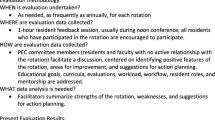Abstract
OBJECTIVE: To improve the quality and specificity of written evaluations by faculty attendings of internal medicine residents during inpatient rotations.
DESIGN: Prospective randomized controlled trial.
SETTING: Four hospitals: tertiary care university hospital, Veterans’ Administration hospital, and two community hospitals.
PARTICIPANTS: Eighty-eight faculty and 157 residents from categorical and primary-care internal medicine residency training programs rotating on inpatient general medicine teams.
INTERVENTION: Focused 20-minute educational session on evaluation and feedback, accompanied by 3 by 5 reminder card and diary, given to faculty at the start of their attending month.
MEASUREMENTS AND MAIN RESULTS: Primary outcomes: 1) number of written comments from faculty specific to unique, preselected dimensions of competence; 2) number of written comments from faculty describing a specific resident behavior or providing a recommendation; and 3) resident Likert-scale ratings of the quantity and effect of feedback received from faculty. Faculty in the intervention group provided more written comments specific to defined dimensions of competence, a median of three comments per evaluation form versus two in the control group, but when adjusted for clustering by faculty, the difference was not statistically significant (P=.09). Regarding feedback, residents in the intervention group rated the quantity significantly higher (P=.04) and were significantly more likely to make changes in clinical management of patients than residents in the control group (P=.04).
CONCLUSIONS: A brief, focused educational intervention delivered to faculty prior to the start of a ward rotation appears to have a modest effect on faculty behavior for written evaluations and promoted higher quality feedback given to house staff.
Similar content being viewed by others
References
Eisenberg JM. Evaluating internists’ clinical competence. J Gen Intern Med. 1989;4:139–43.
Miller GE. The assessment of clinical skills/competence/performance. Acad Med. 1990;65(suppl):63–7.
American Board of Internal Medicine. Project Professionalism. Philadelphia: American Board of Internal Medicine; 1994.
Turnbull J, Gray J, MacFadyen J. Improving in-training evaluation programs. J Gen Intern Med. 1998;13:317–23.
American Board of Internal Medicine. Attending Physicians: Your Role in Evaluating Residents. Philadelphia: American Board of Internal Medicine; 1995.
American Board of Internal Medicine. Guide to the Evaluation of Residents in Internal Medicine 1990–92. Philadelphia: American Board of Internal Medicine; 1992.
Gray JD. Globa rating scales in residency education. Acad Med. 1996;71:S55–63.
Thompson WG, Lipkin M, Gilbert DA, Guzzo RA, Roberson L. Evaluating evaluation: assessment of the American Board of Internal Medicine resident evaluation form. J Gen Intern Med. 1990;5:214–7.
Haber RJ, Avins AL. Do ratings on the American Board of Internal Medicine resident evaluation form detect differences in clinical competence? J Gen Intern Med. 1994;9:140–5.
Borman WC. Effects of instructions to avoid halo error on reliability and validity of performance evaluation ratings. J Appl Psychol. 1975;60:556–60.
Ende J. Feedback in clinical medical education. JAMA. 1983;250:777–81.
Ende J. The evaluation product: putting it to use. In: Lloyd JS, Langley DG, eds. How to Evaluate Residents. Chicago: American Board of Medical Specialties; 1986:99–116.
Weinholtz D. Teaching during attending rounds: a manual for attending physicians. Des Moines, Iowa: University of Iowa; 1987.
Skeff K, Stratos G. Feedback. From the Standford Faculty Development Program, Clinical Teaching. Standford, Calif: Stanford University; 1996.
Neufeld V, Norman GR, eds. Assessing Clinical Competence. New York: Springer; 1985.
Huber PJ. The behavior of maximum likelihood estimates under non-standard conditions. Proceedings of the Fifth Berkeley Symposium in Mathematical Probability. Berkeley, Calif: University of California Press; 1967.
White H. A heteroskedasticity-consistent covariance matrix estimator and a direct test for heteroskedasticity. Econometrica. 1980;48:817–30.
Holmboe ES, Hawkins RE. Methods for evaluating the clinical competence of residents in Internal Medicine: a review. Ann Intern Med. 1998;129:42–8.
Veet LL, Shea JA, Ende J. Our continuing interest in manuscripts about education. J Gen Intern Med. 1997;12:583–5.
Education Group for Guidelines on Evaluation. Guideline for evaluating papers on educational interventions. BMJ. 1999;318:1265–7.
Davis JK, Inamdar S, Stone RK. Interrater agreement and predictive validity of faculty ratings of pediatric residents. J Med Educ. 1986;61:901–5.
Maxim BR, Dielman TE. Dimensionality, internal consistency, and interrater reliability of clinical performance ratings. Med Educ. 1996;21:130–7.
Carline JD, Paauw DS, Thiede KW, Ramsey PG. Factors affecting the reliability of ratings of students’ clinical skills in a medicine clerkship. J Gen Intern Med. 1992;7:506–10.
Norcini JJ. Standards and reliability in evaluation: when rules of thumb don’t apply. Acad Med. 1999;74:1088–90.
Kassirer JP. Performance results on the 1995 Internal Medicine certifying examination. ABIM News Update. 1995;Fall/Winter:2–4.
Noel GL, Herbers JE, Caplow MP, Cooper GS, Pangaro LN, Harvey J. How well do Internal Medicine faculty members evaluate the clinical skills of residents? Ann Intern Med. 1992;117:757–65.
Herbers JE, Noel GL, Cooper GS, Harvey J, Pangaro LN, Weaver MJ. How accurate are faculty evaluations of clinical competence? J Gen Intern Med. 1989;4:202–8.
Kroboth FJ, Hanusa BH, Parker S, et al. The inter-rater reliability and internal consistency of a clinical examination exercise. J Gen Intern Med. 1992;7:174–9.
Norcini JJ, Blank LL, Arnold GK, Kimball HR. The mini-CEX (clinical evaluation exercise): a preliminary investigation. Ann Intern Med. 1995;123:795–9.
Kalet A, Earp J, Kowlowitz V. How well do the faculty evaluate the interviewing skills of medical students? J Gen Intern Med. 1992;7:499–505.
Author information
Authors and Affiliations
Corresponding author
Additional information
Portions of this work were previously presented at the 22nd Annual Meeting of the Society of General Internal Medicine, San Francisco, Calif, April 29–May 1, 1999.
Dr. Holmboe was a Robert Wood Johnson Clinical Scholar during completion of this work.
Rights and permissions
About this article
Cite this article
Holmboe, E.S., Fiebach, N.H., Galaty, L.A. et al. Effectiveness of a focused educational intervention on resident evaluations from faculty. J GEN INTERN MED 16, 427–434 (2001). https://doi.org/10.1046/j.1525-1497.2001.016007427.x
Issue Date:
DOI: https://doi.org/10.1046/j.1525-1497.2001.016007427.x




